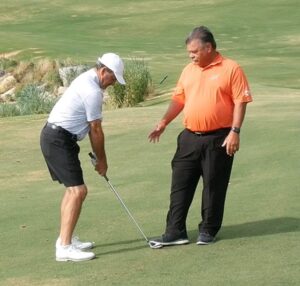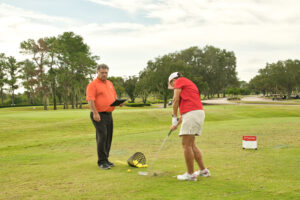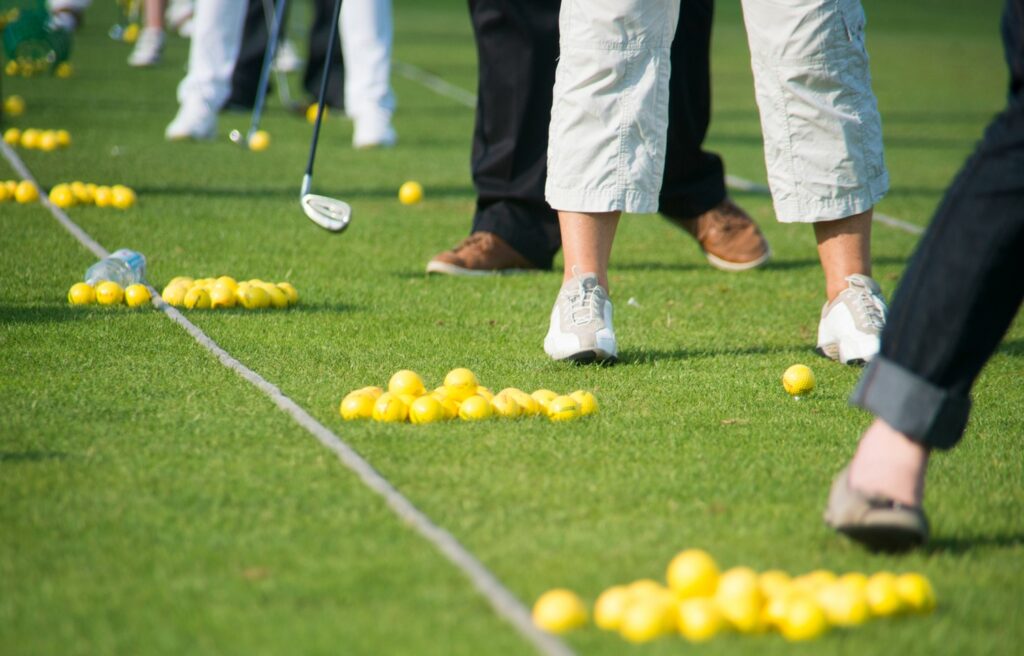It’s Not About Practicing Something New, But Practicing Differently
Many golfers find themselves hitting the same shots over and over, hoping for different results. That’s why they come to John Hughes Golf and schedule what are arguably the best golf lessons in Orlando. And in Georgia! It’s a frustrating cycle that can leave you feeling discouraged and demotivated. The truth is, you’re not practicing something different; you’re practicing the same thing differently. Which is why you must practice differently then the way you are practicing now.
For many golfers striving to improve, the quest for that elusive breakthrough often leads to exploring new methods, drills, or equipment. Even though those new things you practice and/or purchase don’t always lead to the sustained improvement results you are desiring. Yet, the real key to improvement may not lie in practicing something entirely new. Or practicing the same thing thinking you’ll get a different result if you practice the same thing more often. The real key may lie in practicing one skill differently than you have in the past. Let’s explore why this approach is crucial for mastering your golf game.
The Concept of Practice in Golf
 It does not matter the sport or the profession you choose. Practice is only partially about repetition.
It does not matter the sport or the profession you choose. Practice is only partially about repetition.
Most golfers go about hitting countless balls at the practice facility. Or putting until their backs hurt. And when you engage in this type of “block” practicing method, you’ll tend to ingrain a motor movement pattern, your golf swing, that might not be as efficient or effective as you desire.
While repetition is essential for muscle memory and consistency, mindlessly hitting the same ball over and over can and will hinder your progress. It’s like trying to learn a new language by repeating the same sentence endlessly. Sure, you’ll get better at saying that sentence, but your overall language skills won’t improve much.
Let me offer you a different look at practicing golf. A way that can function no matter the skill you want to practice. As well as engaging in new activities, not necessarily new drills, that can lead to more sustainable results.
Proficient vs. Perfect
Let’s first examine the definition of practice. When looking at Webster’s definition of the word practice that applies to you and your golf game is:
“…to perform or work at repeatedly so as to become proficient.”
Most golfers forget about the word proficient”, mistakenly replacing that word with “perfect”. Make no mistake, there is no such thing as perfect. In life, in golf, in anything! If you ask FlightScope, they’ll tell you it takes 1.2 billion shots recorded on their radars around the world to record just 1 perfect shot. Wrap your arms around that stat!
Practice is about proficiency. Your ability to perform a skill, flaws and all, under pressure. And only you can put pressure on you. Practice is about honing specific skills, understanding your body’s mechanics, and ingraining positive habits. Using the performance statistics of your skills, not your scores, you can better understand the specific skills you need to improve the most to gain proficiency. And we can all use better decision-making skills on the course that allows our mechanically proficient skills to work at their best.
We All Have ADD
While it’s tempting to jump from one drill to another in search of improvement, true progress often comes from refining what you already do and know. But are you jumping from drill to drill to discover how you want your swing to feel and repeat? While doing so under the practice theory of randomized practice? Or is your attention span at past its ability to focus and you just want to do something new to say you did?
In one form or fashion, all humans have attention deficit disorder. Our inability to stay focused for long periods of time. Some have very short attention spans while others can keep focused on what seems like days. With ingraining new muscle movement patterns, such as your golf swing, it’s important to understand the threshold of your focused attention as compared to the time needed to absolutely ingrain a new movement. In this case, a better golf swing.
Taking into consideration the nature of our culture, which these days include a lot of distractions. As well as a compulsive need for instant gratification. ADD 3 combined with these other 2 factors strikes us all in a negatively hard way when it comes to creating new habits that are good for us, long term. Particularly when you don’t spend enough time practicing your golf skills for proficiency.
Why Practicing Differently Matters
Here are some reasons why you need to practice differently, not something different, to make the biggest long-term and sustainable improvements to your golf skills. Not your golf swing.
- Breaking Out of Routine: Repetitive practice can lead to a plateau. By changing the way you approach practice, you can disrupt mental and physical routines that may be holding you back. For instance, instead of hitting 100 consecutive drivers, try varying your targets, club selection, or swing speeds. This not only keeps practice engaging but also enhances your adaptability on the course.
- Enhancing Skill Transfer: Practicing differently helps bridge the gap between practice and real play. On the course, you face dynamic situations—different lies, varying wind conditions, and unpredictable
 breaks. By introducing variability into your practice sessions, such as practicing shots from uneven lies or playing with different club combinations, you better prepare for these real-world challenges.
breaks. By introducing variability into your practice sessions, such as practicing shots from uneven lies or playing with different club combinations, you better prepare for these real-world challenges. - Swinging Small and Slow: It is a proven fact that our bodies learn new movement patterns in slow and small motions. Not big ones. The way we learned to walk is a perfect example. Why is this a truth? Because our equilibrium must determine the balance point of all our movements to repeat the movement with any fluidity or smoothness. And it’s not until we can move smoothly and fluid that we can build in speed.
- Focus on Fundamentals with a Fresh Perspective: Fundamental skills like grip, stance, and swing mechanics are the backbone of golf. Revisiting these basics with a new approach can lead to breakthroughs. For example, instead of solely working on a full swing, dedicate a session to slow-motion swings or focusing on your follow-through. This fresh perspective can reveal insights that might be missed during traditional practice.
- Mental Engagement: Golf is arguably more a mental game than it is physical one. Practicing the same skills differently engages your mind in new ways, promoting better concentration and problem-solving. Try incorporating visualization techniques, mindfulness, or even competitive drills to keep your mind sharp and focused.
Practical Tips for Practicing Differently
The following are suggestions and examples of how you can practice skill building differently yet effectively to engrain new muscle movements and patterns. Not all these suggestions work for all people. But collectively, there is at least 1 or 2 of the methods below that will assist you as an individual with making your practice more purposeful and efficient. And all of these tips, and others, I use withing every John Hughes Golf coaching program.

- Varied Drills: Mix up your practice routine by incorporating a variety of drills that target different aspects of your game. Use a combination of traditional drills and creative exercises to keep things interesting and effective.
- Simulation: Create game-like scenarios in your practice sessions. For example, simulate a round by hitting a series of shots with different clubs, or practice pressure shots by setting challenges for yourself.
- Feedback and Reflection: Use video analysis or feedback from a coach to gain a new perspective on your technique. Reflect on what works and what doesn’t and adjust your practice accordingly.
- Cross-Training: Engage in activities outside of golf that improve your overall fitness and coordination, such as yoga, strength training, or agility exercises. This helps enhance your physical capabilities and can translate into better performance on the course.
- Circumstantial Practice: When you’re on the course attempting to shoot the lowest score possible, you only have one chance at every shot. Do you practice in the same manner? Are you willing to sacrifice something if you do not perform a skill while practicing? Learning to practice under pressure requires a circumstance to every practice shot.
Conclusion
Golf is a lifelong journey of improvement and discovery. While the temptation to seek new methods or equipment is strong, the true path to mastery often lies in rethinking how you practice the fundamentals. By practicing the same skills differently, you break free from monotony, better prepare for the varied demands of the game, and keep your mind and body engaged.
Improving your golf game requires a commitment to continuous learning and adaptation. By varying your practice routine and challenging yourself, you’ll not only see improvement in your scores but also experience a renewed sense of enjoyment for the game. It’s not about practicing more. It’s about practicing smarter. By focusing on quality over quantity, you’ll be well on your way to achieving your golf goals.
Remember, improvement in golf isn’t always about adding something new. Sometimes it’s about approaching what you already know in a new way. The next time you’re at the practice area or the practice green, consider how you might practice differently. Consider John Hughes Golf and his coaching programs to find new methods to make your practice and improvement smarter. And watch your game evolve in exciting new ways. Faster than you’ve experienced in the past.



 breaks. By introducing variability into your practice sessions, such as practicing shots from uneven lies or playing with different club combinations, you better prepare for these real-world challenges.
breaks. By introducing variability into your practice sessions, such as practicing shots from uneven lies or playing with different club combinations, you better prepare for these real-world challenges.


